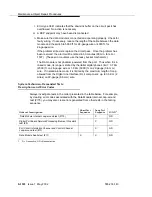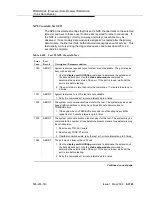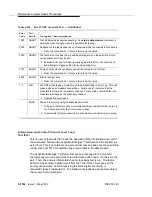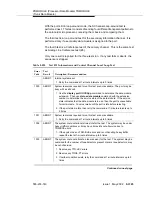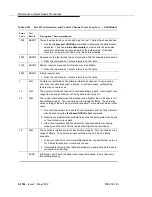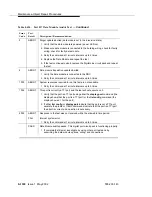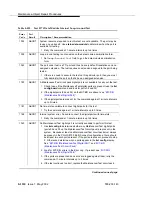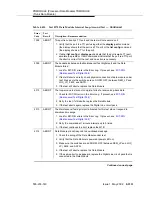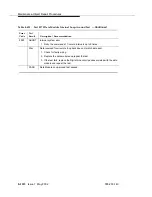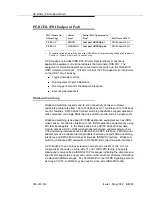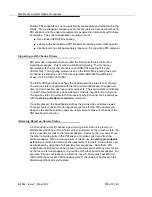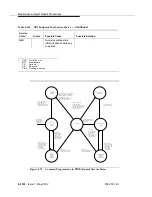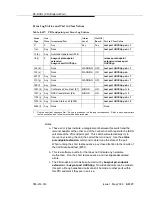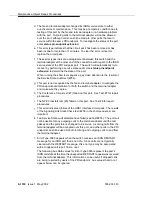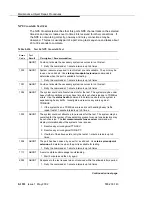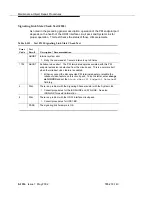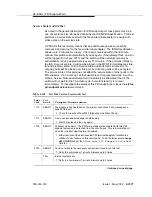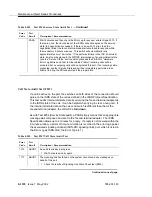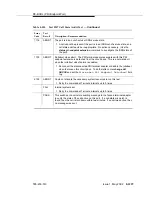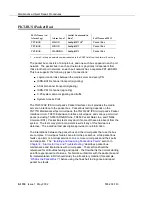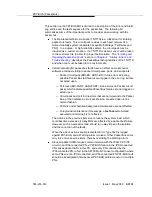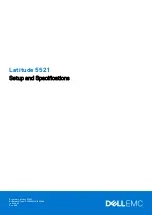
Maintenance-Object Repair Procedures
555-233-143
8-1216
Issue 1 May 2002
■
Out-of-Service/Far-End (OOS/FE)
A B channel is initialized to this state when first administered. The switch
then sends messages to the far-end terminal adapter to negotiate the
B channel into service. If the far-end terminal adapter does not respond to
the messages within a certain time period, the port remains out of service,
and maintenance will periodically resend the messages. The port is
unusable for incoming and outgoing calls, although other ports in the PRI
endpoint can still be used.
■
Out-of-Service/Near-End (OOS/NE)
This is the state of the port when a hardware failure exists on the signaling
link, the NPE Crosstalk test fails, or when the port is busied out by
command. In this state, the port is unusable for calls coming into the
switch or going out to the terminal adapter, although other ports in the PRI
endpoint can still be used for incoming and outgoing calls. No messages
are sent to the far-end terminal adapter until the signaling link comes back
into service or the port is released by command.
■
Maintenance/Far-End (MTC/FE)
This state is reached when the far-end terminal adapter does not respond
to messages sent over the signaling link for a particular port within a certain
amount of time. This state is different from OOS/FE since the signaling link
must have initially been up and the B channels in service. The switch will
periodically send messages to the far-end terminal adapter to try to
negotiate the port (B channel) into service. The port is unusable for
outgoing calls to the terminal adapter but will service incoming call
requests from the far end. Other ports of the PRI endpoint can still to place
outgoing calls to the terminal adapter. Transitions into MTC/FE do not drop
stable calls. If the service state changes from in-service to MTC/FE, stable
calls are unaffected.
■
Maintenance/Near-End (MTC/NE)
The signaling link (SYS-LINK) is busied out by the busyout, test port l or
test pri-endpoint l commands. Transitions into MTC/NE do not drop
stable calls. The busyout link lnk-no command does not drop stable
wideband calls. In this state, the B channel is not usable for new incoming
calls to the switch or new outgoing calls to the terminal adapter.
■
Pending States (PEND)
If the near end is expecting a timed response from the far end for a request
to change the service state of a port, a pending state is in effect. For
example, if the port is out-of-service/far-end and an in-service message
was sent to the far end, then the service state of the port is
OOS/FE-PEND/INS meaning out-of-service/far-end, pending/in-service.
The service state will reflect this pending state until the far end responds or
the timer expires.
Summary of Contents for S8700 Series
Page 50: ...Maintenance Architecture 555 233 143 1 26 Issue 1 May 2002 ...
Page 74: ...Initialization and Recovery 555 233 143 3 12 Issue 1 May 2002 ...
Page 186: ...Alarms Errors and Troubleshooting 555 233 143 4 112 Issue 1 May 2002 ...
Page 232: ...Additional Maintenance Procedures 555 233 143 5 46 Issue 1 May 2002 ...
Page 635: ...status psa Issue 1 May 2002 7 379 555 233 143 status psa See status tti on page 7 406 ...
Page 722: ...Maintenance Commands 555 233 143 7 466 Issue 1 May 2002 ...

